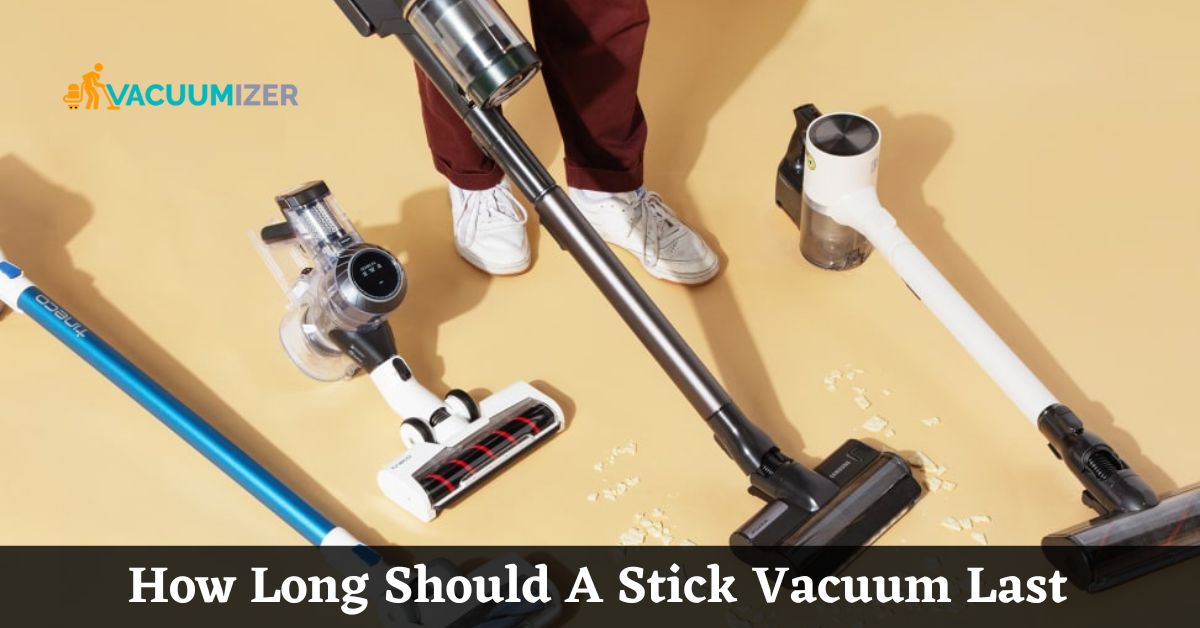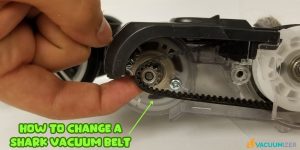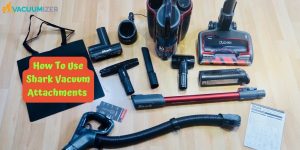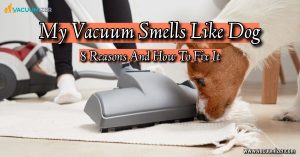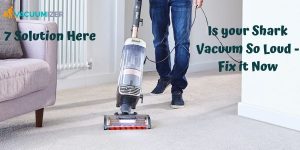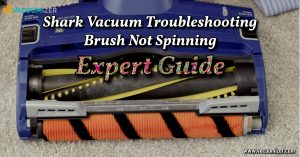Stick vacuums have become popular cleaning tools in the modern world because they are easy to use and clean well. The way we clean our homes has changed a lot because of how sleek and light these tools are. But an important question arises: How long should a stick vacuum last? How long a stick vacuum lasts depends on many things, such as:
How well it was made,
How often it is used,
How it is taken care of, and
How well-known the name is.
But this article will explore how long a stick vacuum should last. As well as we will explore what factors affect its lifetime.
Let’s start!
First of all, you will know how a stick vacuum works.
Table of Contents
How Does a Stick Vacuum Work?
A stick vacuum works just like a small vacuum. It has a small motor picks up dirt and dust from the floor. When you turn it on, the motor starts sucking, which pulls all the dirt into the vacuum. There is a part called a dustbin that catches the dirt. It looks like a small box where all the dirt goes.
The stick cleaner also has a battery that can be charged, so it can be used without being plugged in. You can clean different things with different tools, like brushes. Because it’s small and doesn’t have a cord, it’s easy to move around the house to clean.
Next, you will know the average lifespan of a stick vacuum.
What is The average lifespan of a stick vacuum?
The average life of a stick vacuum depends on 4 things;
- Its brand,
- Its quality,
- How it is used, And
- How well it is taken care of.
Using a stick cleaner regularly will last anywhere from 3 to 5 years or longer. Some high-end types last longer because they are made better and are more durable. Here are some high-quality stick vacuum models and brand names:
- Dyson V11 Absolute
- Shark IonFlex DuoClean
- Tineco Pure One S12
- LG CordZero A9 Ultimate
- Bissell ICONpet Pro
- Hoover ONEPWR Blade+
- Miele Triflex HX1
- Samsung Jet 90 Pro
- Electrolux Pure F9
- Roborock H6
These models often have advanced features like;
- Strong suction power,
- Long battery life,
- Multiple tools for cleaning in different ways
- Smart technology that makes cleaning easier.
But, like any other device, wear and tear over time can cause it to work less well and need to be replaced. If a stick vacuum starts to lose sucking power, lasts less time on a charge, or has other problems, it might be time to consider getting a new one.
Next, you will know what factor to increase the life of a shark vacuum.
5 factors help to extend the life of a stick vacuum
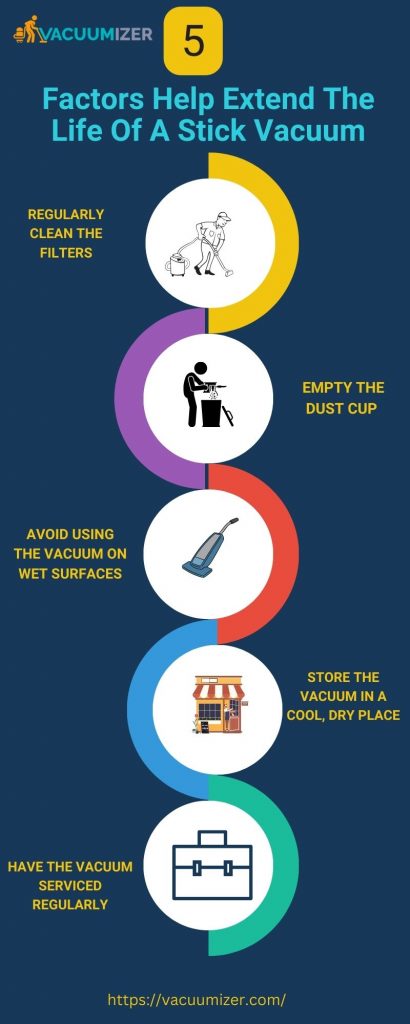
Several factors can influence the lifespan of a stick vacuum, including:
Regularly clean the filters
The filters catch dust and other small particles, so cleaning them often is essential so they don’t get stuck. This will help the vacuum work better and keep it from getting too hot. As a result, your vacuum will last a long time.
Empty the dust cup often
When the dust cup is complete, it should be emptied. This will keep a vacuum from getting too big and hard to move around.
Avoid using it on wet surfaces
Stick vacuums are not made to be used on wet surfaces, so don’t use them there. This can hurt the vacuum and make the guarantee useless, but if you want, you can use it on hard surfaces.
Store the vacuum in a cool, dry place
The cleaner should be kept in a cool, dry place when it’s not being used. This will help keep the hoover from breaking when the weather or humidity is too high or too low.
Have the vacuum serviced regularly
It may break down more often if you don’t keep the vacuum in good shape. Regularly having a trained expert work on the vacuum can help it last longer.
Next, you will know some types of vacuums and their lifetime.
Types of Vacuums and Their Lifespan
Nowadays, there are several types of vacuums in the market. Each type has its pros and cons. Also, the lifespan of a vacuum depends on the type you choose.
Upright Vacuum Cleaners
These are the most common types of vacuum cleaners. They are very good for cleaning carpets and floors. Upright vacuums have an average warranty period of around 8 years.
Canister Vacuum Cleaners
Canister vacuums are better than many vacuums. usually lighter than upright vacuums. Making them easier to move around. They are also more versatile because of their several attachments. To clean different surfaces. Canister vacuums have an average lifespan of around 7 years.
Stick Vacuum Cleaners
Stick vacuums are lightweight and cordless. Making them very easy to use. They are great for quick clean-ups. Also are perfect for small apartments. Stick vacuums have an average lifespan of around 5 years.
Handheld Vacuum Cleaners
Handheld vacuums are small, lightweight, and portable. They are perfect for cleaning small areas like cars, upholstery, and stairs. Handheld vacuums have an average lifespan of around 4 years.
Next, you will know some common questions about strict vacuums.
FAQs on Stick vacuum cleaner
Can I use a stick vacuum for cleaning carpets?
Yes, stick vacuums can clean carpets. But, it depends on the model and the type of carpet. If you have a thick carpet or one that is prone to shedding. A stick vacuum may not be powerful enough to pick up all the dirt and debris.
How often should I replace my vacuum?
As we mentioned earlier, the average lifespan of a vacuum is around five years. But, if your vacuum is showing signs of wear and tear. or if it’s not cleaning as effectively as it used to, it may be time to replace it.
What should I look for when buying a new vacuum?
When buying a new vacuum, consider factors such as the type of flooring in your home. The size of your home, the type of dirt and debris you need to clean, and your budget. Look for a vacuum that is powerful enough. Cleaning your floors effectively has good suction and is easy to maintain.
Finally, we are going to the final message.
Conclusion
The lifespan of a stick vacuum can vary depending on several factors. But, on average, a stick vacuum can last between two and five years. Regular maintenance, such as cleaning the filters. and emptying the dust canister or bag can help extend the life of your vacuum.
When shopping for a new vacuum, consider factors such as the type of flooring in your home, the size, and your budget. Look for a vacuum that is powerful enough to clean your floors effectively, has good suction, and is easy to maintain.
By following these tips, you can help ensure that your stick vacuum lasts as long as possible and continues to keep your floors clean and dust-free. I hope you understand how long should a stick vacuum last in this article.

